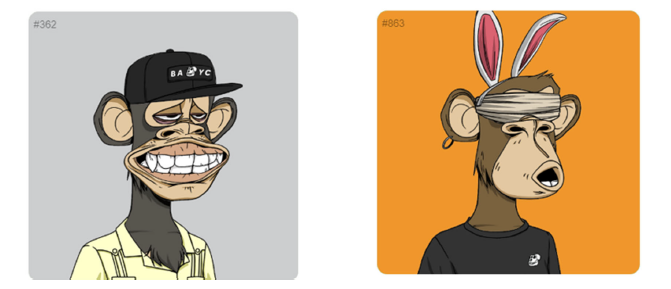- Home
- News & insights
- Insights
- Bored Apes
1 July 2022
METAVERSE JUNE 2022 2/2 – 2 of 3 Insights
Bored Apes: a first look at Yuga’s lawsuit against Ryder Ripps
- Briefing
Yuga Labs Inc., a blockchain technology company that specialises in developing digital collectibles, has filed a lawsuit against Ryder Ripps over the sale of alleged copycat NFTs and a consumer scam related to the Bored Ape Yacht Club. If you are new to this space, you may enjoy reading our introductory piece on NFTs here.
What is Yuga and who are the Bored Apes?
Yuga Labs is the parent company behind one of the most famous and most valuable collections in the NFT space. Their Bored Ape Yacht Club is especially well known, with one set of Apes being sold for $24.4 Million last year and the company itself was recently valued at $4 billion. The entire collection consists of 10,000 unique Apes and they represent an exclusive community which includes prominent celebrities such as Seth Green and Jimmy Fallon. The Bored Apes are also attracting increased attention in the media and have even been featured on the cover of magazines such as Rolling Stone or utilised by brands such as Adidas. According to the Terms and Conditions of the Bored Ape Yacht Club, holders of Bored Apes enjoy a worldwide license for personal and certain types of commercial use. That being said, there is a debate in the legal community how far reaching the license really is.
Who is Ryder Ripps?
Ryder Ripps is a self-proclaimed “conceptual artist” known for previous controversial projects which, some would argue, could be considered satire, stunts and design work. Ripps has already been confronted with claims brought against him in the past based on the Digital Millennium Copyright Act (DMCA) and allegations of artistic plagiarism.
What is the background to the dispute?
Yuga filed the lawsuit against Ripps and others before the Central District of California. The lawsuit is based on unfair competition, false advertising, cybersquatting, trade mark infringement and other causes of action.
Yuga claims that Ripps scammed consumers into purchasing a copycat NFT collection consisting of the original Bored Ape Yacht Club images. According to Yuga, Ripps does not only use identical trade marks but also falsely markets his collection as equivalent to the authentic Bored Ape Yacht Club NFTs. Moreover, Ripps is accused of promoting his future marketplace “Ape Market” to sow confusion among consumers about whether his NFTs are in some way connected to the official Bored Ape Yacht Club. In what has already become a famous quote from the statement of claim, Yuga contends that this “is no mere monkey business” but a deliberate effort to harm them at the expense of consumers.
According to Yuga, Ripps and others created a website in May 2022 that allowed users to reserve an NFT to be minted by Ripps. These NFTs allegedly used the exact same images that were created by Yuga. Moreover, the “new” collection was named “RR/BAYC” and the website contained several of Yuga’s trade marks, such as the designation “BAYC”, the “BAYC” logo as well as the logo of an ape skull.
The “RR/BAYC” NFTs could also be traded on OpenSea, one of the leading NFT marketplaces. The example below is contained in the statement of claim, with the NFT on the left being an official Bored Ape Yacht Club NFT, whereas the NFT on the right is the “corresponding” RR/BAYC NFT.

;
Given that the RR/BAYC NFTs used the same images as the official Bored Ape Yacht Club collection, they “naturally” also contained the brands depicted in these images. The below examples from the statement of claim show the alleged fake NFTs #362 and #863 from Ripps (containing the ape skull and the BAYC logos).

Is this “appropriation art”?
Ripps claims to have used satire and a twist on appropriation art to educate people on the Bored Ape Yacht Club and on NFTs in general. He alleges that the Bored Ape Yacht Club has "extensive connections" to "subversive internet nazi troll culture" and that most Apes’ “traits are racially oriented or involve some type of military history”. He thus calls Yuga Labs out on supposedly contributing to the perpetuation of simianization, which disparagingly compares racial and ethnic minorities to apes. He compares the Bored Ape Yacht Club logo with the Totenkopf symbol used by the Nazi SS. Ripps also alleges that the pseudonyms used by the creators of the Bored Ape Yacht Club contain coded white supremacist words and symbols. His work thus supposedly recontextualises the Bored Apes through “illuminating truths about their origins and meanings as well as the nature of Web3”. Yuga Labs denies any connections to white supremacy and racism, and the Anti-Defamation League have also expressed doubts on Ripps’ evidence.
What are initial takeaways for IP holders?
For observers of the NFT space, this lawsuit may not come as a surprise. It is true that the web3 community has a particular view on IP law in general. Many advocate a laissez-faire spirit in line with the internet meme culture, where users should supposedly be free to largely copy existing artwork. Successful NFT projects often have the questionable honour of attracting one or several derivative collections copying or alluding to the artwork and/or the brands of the original series. At times, such derivative projects are accompanied by additional narratives in support of their ‘raison d'être’. This could be a switch from one blockchain to another, donations to a good cause or an unexpected conversion of different projects.
At the same time, the originators not only have to keep the possible impact on the floor prices of their NFTs in mind but also the value and strength associated with their brand. In conventional trade mark terms, the distinctiveness of a trade mark (i.e. its strength) will suffer if a number of identical or similar marks are used by third parties without consent. Under such circumstances, consumers are assumed to learn over time that the word, logo or other sign in question no longer indicates a specific commercial origin. If a brand owner tolerates this situation for too long, they may not be in a strong position to take effective action further down the line if they do want to stop an infringement of a (different) third party.
Interestingly enough, Yuga has decided not to raise any copyright claims. The Internet is ripe with speculations as to why that may be the case. Many observers stress that there would certainly have been interesting copyright questions at play. We will cover issues of both trade mark as well as copyright law in later editions of our Metaverse Update. Watch this space!
The authors would like to thank Sylvia Burgess-Tate for her assistance in researching and preparing this piece.
In this series
Bits and pieces from the Metaverse
Issue #04
20 June 2022
Bored Apes: a first look at Yuga’s lawsuit against Ryder Ripps
1 July 2022
AI-generated works: a dead end from a copyright law perspective
Flash IP
28 June 2022

